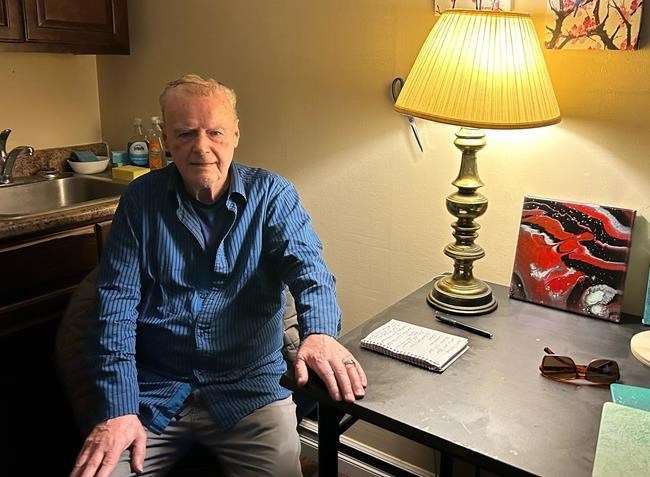FREDERICTON — A New Brunswick man who spent decades fighting a wrongful murder conviction that landed him and a friend behind bars had only a few months to relish his victory, the organization that helped in his legal battle said Saturday as it announced his death.
Innocence Canada, which led the legal fight to exonerate Walter Gillespie and his friend Robert Mailman of their 1984 murder convictions, said Gillespie died Friday in his home in Saint John, N.B., at the age of 80.
Founding director James Lockyer lamented the fact that Gillespie had such a brief time to enjoy the fruits of his decades-long fight.
"It's very sad," Lockyer said. "I'm just glad that he managed to have his name cleared before he died. That was so important to him."
Details about Gillespie's cause of death were not immediately known.
In January, New Brunswick Court of King’s Bench Chief Justice Tracey DeWare acquitted Gillespie and Mailman, 76, of the 1983 murder of Saint John resident George Leeman and apologized for the "miscarriage of justice."
Her ruling came after federal Justice Minister Arif Virani ordered a new trial on Dec. 22, saying evidence had surfaced that called into question "the overall fairness of the process."
Ron Dalton, now co-president of Innocence Canada, took up the men's case when he was fighting for freedom from his own wrongful conviction.
He called Gillespie a "study in strength of character and friendship."
"For 40 years (Gillespie) refused to falsely implicate his friend, Robert Mailman, and paid dearly with his freedom," Dalton said. "A sad end to a difficult but honourable life."
In an interview in January, about a week after he was formally exonerated, Gillespie recounted the offer of freedom dangled before him a year after Leeman's murder.
He said he was told by Saint John police that if he signed a statement against Mailman, he would be charged with aiding and abetting and only face three years in prison.
"I said I was not going to do that," he said. "(The officer) said, 'if you're going to protect (Mailman), you're going down with him.'"
He spent 21 years in prison.
Gillespie was born on Aug. 31, 1943, in Saint John and had a Grade 6 education. Most of his immediate family died in a house fire when he was about 20.
His friendship with Mailman predated their shared legal ordeal. The men previously told The Canadian Press they met in 1961, with Gillespie joking Mailman was checking out his then-girlfriend during one of their first encounters.
They became inseparable after their wrongful convictions, speaking to each other every day for decades.
"We've been joined at the hip for over 40 years through this. And he's like a brother," Mailman said of his friend.
Mailman was not available for comment on Gillespie's death on Saturday, but said through Dalton that he hadn't been able to sleep well after learning the news.
In an earlier interview, Mailman described the friend he called Wally as a man of few words.
"You never bother a sleeping junkyard dog," he said with a laugh.
Gillespie is survived by a daughter with whom he only recently began to reconnect.
"We haven't connected for almost the last 40 years," he said shortly after having his name cleared. "... I'm hoping I can help her out if we can get any money or anything like that. I talked quite a bit with her over the last couple days or so. Oh, it feels great."
The New Brunswick government reached a settlement with the two men on March 1 for an undisclosed sum.
While on parole, Gillespie lived at a halfway house where he also worked as a cleaner for 15 hours a week.
After being declared innocent, he moved to an apartment in Saint John for which he paid $800 a month. The former hotel room he described as a jail cell was cramped even with his minimal belongings, brightened only by his own colourful paintings and the set of white towels and a white tea kettle Mailman gave him as housewarming gifts.
"Wally shouldn’t have to come out of the prison … and to a halfway house all them years, only to go into a place that’s even worse than he left behind," Mailman said of his friend's spartan quarters.
When Mailman was diagnosed with terminal cancer last November, Gillespie was the first person he called.
Gillespie signed out of the halfway house for a day and spent it with his friend as he learned of the life-changing diagnosis.
Apart from his quiet conviction and strength of character, Dalton recalled Gillespie's love of American author Zane Grey's westerns and his voracious reading habits. He also remembered Gillespie's flashy fashion sense, noting his penchant for bright colours and the black patent shoes he saved for a special occasion and finally wore to court on the day his name was cleared.
But he said Gillespie's most enduring impact stems from his efforts to uphold justice in Canada's correctional system.
"Mr. Gillespie helped raise awareness of wrongful convictions in this country and that will be a part of his legacy.”
This report by The Canadian Press was first published April 20, 2024.
Hina Alam, The Canadian Press



